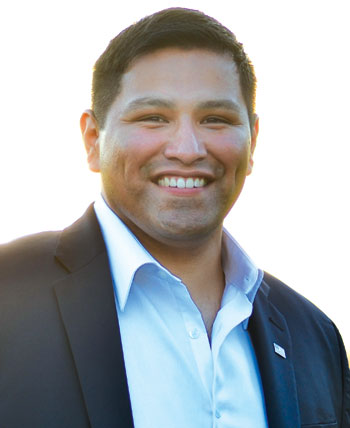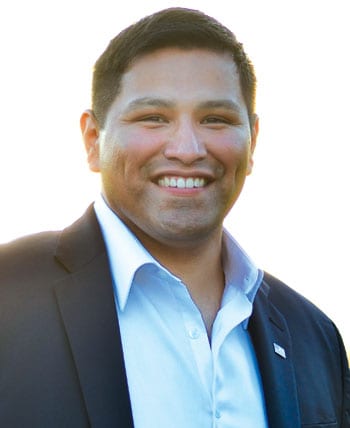Louie Minor talks exclusively to Dallas Voice about taking on tea party incumbent John Carter in Texas Congressional District 31

REPORTING FOR DUTY | If elected, Louie Minor would become the first openly gay member of Congress from Texas and the first gay veteran and first gay Hispanic to serve. (Courtesy photo)
ANNA WAUGH | News Editor
Louie Minor has a lot of titles: veteran, father, Democratic candidate, and he hopes to add Texas’ first openly gay congressman to the list next fall.
Minor, 34, is challenging Republican incumbent John Carter in the Republican-leaning Congressional District 31. The suburban Austin district includes all of Williamson County and most of Bell County, from a portion of north Austin to Temple. It also includes Fort Hood.
Carter, first elected in 2002, has received a zero each session on the Human Rights Campaign Congressional Scorecard, which rates members of Congress on their support for LGBT issues.
A native of CD 31, Minor grew up in Belton. He’s a veteran and a captain in the Army Reserves, and has spent a decade in the military, even serving 14 months with the Texas National Guard in 2008–09.
He recently spent a year and a half working for the Department of Homeland Security in Washington, D.C., before resigning his position as a federal employee earlier this year in order to run for office.
Minor is the first openly gay candidate to run for a Texas congressional seat in 15 years. James Partsch-Galvan ran as a Libertarian in 1998 against Rep. Sheila Jackson-Lee in Houston’s District 18.
Before that, Barbara Jordan held that district seat from 1973–79. While she never acknowledged her sexual orientation publicly, the Houston Chronicle mentioned her longtime partner in her obit in 1996.
If elected, Minor would be the first openly gay Congressman from Texas, as well as the first openly gay member of Congress who is a veteran and who’s Latino. On Dec. 3, Minor wrote on his Twitter account: “It’s official. We’re on the ballot.”
Dallas Voice: Why did you decide to run for office?
Louie Minor: I saw the current representative doesn’t represent me, my family or the majority of Texans. I believe the future of Texas is at jeopardy, and our country if we continue to let tea party Republicans be our voice in Congress. So that’s why I decided to run.
What was it like serving under DADT? You’re just worried about the safety of your guys and accomplishing your mission. So, that really didn’t affect me too much as far as “don’t ask, don’t tell.” It affects you more when you’re at home because what happens is you had to be one way at work and then you had to be a different person when you’re at home.
Did you come out after it was repealed? I really didn’t come out in the military. I have a 15-year-old daughter, so people never really questioned me about my sexuality much. And after years and years of living with keeping my work and personal life separate, I just always maintained that. I would never invite co-workers over to my place to do anything. I guess I really don’t think about it because that was the norm for me to have that separation and to keep that personal life separate from work. But I think now probably the biggest difference is just having a family picture up, and not being afraid to have that up.
What would it mean to you to be the first openly gay Congressman from Texas? I thought about it, and I was humbled by that [opportunity], and then just the fact that I’ll be the first openly gay veteran to be in an elected office in Congress. To me, there’s no words to describe just how humbling that is.
Are you worried about running against an incumbent, especially a tea party conservative? I’m absolutely not concerned at all. I used to be a Republican several years ago prior to me joining the military and after leaving, because that’s all I knew. That was the only thing that was around. I thought that was acceptable. But after joining the military and being exposed to more diversity, that’s when I realized I am a Democrat and the Democratic Party represents me and my family more than the Republican Party. As far as running against the tea party, yeah it’s going to be a hard fight, a hard race, but it’s one that’s necessary.
District 31 has some conservative areas. Has your being an openly gay congressional candidate sparked dialogue about the changing times in Texas politics? I don’t think it’s widely known yet as far as my sexual orientation because I’m more than a gay candidate. But it’s not something that I think is widely known. Obviously that’s something that I’m not shy to talk about. It’s something that I fought for in Iraq to be who I want to be. I don’t plan on shying away form that. If anyone asks me, I will tell them I am gay, but I’m a veteran, and I served my country. I’ve been in public service my entire adult life. I don’t look at a person’s background or education or party or religious beliefs. I just look at a person, and I want to help that person, and I think a majority of the people here in the district and across the country are not getting the help that they need to live a better life.
What will be your priorities if elected? Education is key for me. I’m a first-generation college graduate, so I know how important it is for someone to have a college education, what that means financially and as far as moving up the social ladder, so education is key. The next big priority would be the economy. My father’s a small business owner, and back in the early 90s when the recession hit, he lost his business, and he had to rebuild it. And whenever something happens to the economy, the small business owners are the last people to get help but the first ones affected by the economy, so I want to make sure that small business have a voice and resources available to them, so they can fulfill their dreams of having a small business. And the last thing would be veterans and military since this district has Fort Hood in it and one of the largest VA hospitals in the state, making sure that their needs are addressed approximately.
What will be your priorities for the LGBT community? I will support marriage equality. I think that’s a big thing. It’s something that I think should be a non-issue. I think government and elected officials should be concerned with other things like the economy and educations and veteran’s issues, not so much social issues. So anything I can do to support equality from Washington, D.C., I’m going to do that, all across the board, whether it be employment or any type of discrimination. … I have friends here in Texas who are part of the LGBT community, even my youngest sister, she’s gay as well, and I know there’s a day, and that’s what I’m going to fight for, that we can marry in Texas.
That’s definitely something I would like to see in my lifetime, and I know it’ll happen. We just need to have a voice in Washington to fight for that.
This article appeared in the Dallas Voice print edition December 6, 2013.













